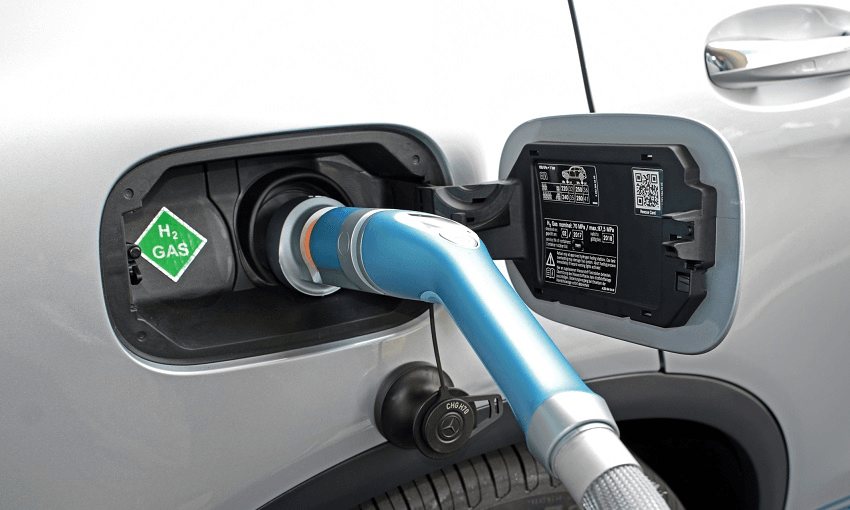To mark the launch of the Helen Clark Foundation‘s first report, its executive director Katherine Errington writes about New Zealand’s potential to become a ‘green’ hydrogen exporter.
Much has been written about hydrogen of late, debating its place in the transition to clean energy.
Globally, the debate is broadly split between Japan and North America. Japan is moving forward with significant investment into hydrogen. For example, their government aims to have hydrogen cost competitive with gas by 2030, and for there to be 800,000 hydrogen vehicles on the road by 2030.
On the other side is North America, personified by Elon Musk, where the rallying call is ‘electrify everything’. Why, he asks, would you use energy to turn electricity into hydrogen if you can just use the electricity directly? Some commentary in New Zealand is clearly influenced by this way of thinking.
But I would argue uncritically repeating these North American arguments in New Zealand misunderstands where we fit in the world and threatens a promising new export industry. A deep understanding of what is happening in Japan is vital. So is understanding the government framework that international investors expect before making investments in a nascent industry – we cannot disconnect the domestic from the international. Dismissing the domestic potential for green hydrogen also misses opportunities to decarbonise in areas where electrification is difficult or impossible.
Japanese policy settings are of particular import to New Zealand in regards to hydrogen. This is because relative to most, if not all countries, Japan needs to import renewable energy. Japan imports a whopping 93% of its energy. Yet somehow, it must decrease carbon emissions by 80% by 2050 under the Paris agreement. New Zealand, on the other hand, relative to most if not all countries, is very well placed to export renewable energy. We have considerable consented geothermal and wind capacity that is not currently utilised, as well as other advantages from Japan’s perspective, like a relatively quick and secure shipping route.
This export industry could lead to a large supply of clean hydrogen coming online in New Zealand. We would be foolish not to plan what we might do with it as a spinoff domestic environmental and business opportunity.
Domestically, hydrogen could one day play a role to manage spikes in demand and intermittent renewables, displacing coal and gas. It can be stored as liquid and production at hydrogen plants can be quickly scaled up. For example, during a year that New Zealand’s hydro lakes are low. Hydrogen could be made at times when the fluctuating wholesale electricity market price is very low. This flexible hydrogen production could allow for the last piece of fossil fuel generation to be pushed off the grid.
Hydrogen could also be a way to decarbonise parts of the transport sector that are difficult to electrify, for example, heavy vehicles and trains.
Of course, the industry is in its early days. The technology to make clean hydrogen – that is hydrogen generated by electrolysis from renewable electricity – is in the early stages of commercialisation. The costs are set to drop dramatically over the next few years. The main evidence of this is significant investor interest.
A pilot plant to generate hydrogen from geothermal electricity built by Obayashi Corporation, in partnership with Tuaropaki Trust began construction in January 2019 near Taupō. This pilot aims to trial the generation of renewably produced hydrogen for export to Japan, and if successful, will scale up to commercial operation.
Other interested companies from Japan have been investigating doing business here in hydrogen. To facilitate this, our government achieved the first Memorandum of Cooperation (MoC) with Japan in the world on hydrogen last year. Here I must confess to somewhat of a conflict of interest – I was until December last year a New Zealand diplomat stationed in Tokyo. I helped negotiate the text for this agreement.
The MoC text explicitly commits New Zealand to work on a strategy or ‘roadmap’ to increase the uptake of hydrogen domestically. Its inclusion is no accident and should be seen to reflect the wishes of prospective investors who would have been consulted on the wording. International partners expect a consistent government strategy as a foundation to any commercial activity. Perceived weak commitment from government would undermine private sector confidence in the various projects being considered across New Zealand.
This is the danger in the ‘just leave it to business’ approach regarding domestic hydrogen uptake advocated by some electrification advocates. Next generation industries in their establishment phase need strategic investment from government. Or else they will not eventuate.
Furthermore, many partners internationally do not recognise an absolute separation between government and business. Whether we like it or not, central government policy about the use of hydrogen in New Zealand will have a major influence on whether international companies choose to invest. Current projections have the global hydrogen trade worth US$215 billion by 2022. Doing nothing would see much of this investment diverted elsewhere.
Other countries are catching up, with bigger budgets. If New Zealand sits on its hands we could lose a hard-won advantage.

